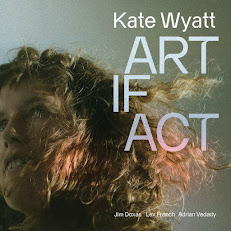 |
| Photo: Dave Stapleton |
The duo of
Sachal Vasandani (voice) and
Romain Collin (piano) issued their first album "
Midnight Shelter" (Edition Records) in Spring 2021––it seemed the perfect escape during pandemic times. Not because it was "escapist entertainment" but because of how made the listeners feel the various emotions one has in contemplation. Perhaps it was Vasandani's unadorned vocals or Collin's clear, clean, accompaniment, maybe because the duo took music from folk, rock, and elsewhere, unifying them in sound and delivery so the listener could hear and feel the words. There was no improvisation, no feats of vocal techniques, just pure, clean, song. When you think about it, that's a gift but also a return to balladry. Not sure I was ready for the intimacy of the first album; at the time, the world was sick from worry about COVID-19, scared of the variants, and tired of being cooped up, I just wanted to sit with my friends, see my family, go to a concert and not watch it on a computer screen or television in 2-D but feel music coursing through my body and others, a communal experience.

Just over a year later comes
"Still Life", the duo's second adventure for Edition. It would be easy to write that this is more of the same but only on the surface. There is still the excellent choice of material; the smashing choices of Elizabeth Cotton's "
Freight Train", the timeless Paul Simon's musical warning "
The Sound of Silence", and Ray Reid's "
I Can't Make You Love You" (arguably the best song ever composed by a ex-football player––former Cincinnati Bengal Reid with Allen Shamblin) are among the immediate standouts. There are three original songs worth your attention. The album opens with Vasandani's "
No More Tears" which at the onset has the urgency of a Robert Johnson blues tune and then turns into a subtly powerful jazz tune. "
Someone Somewhere" comes from a collaboration between the vocalist and drummer
Nate Smith, a down-tempo ballad where the piano chords seem to float below and around the words. "
How Could We Be" is a lament composed by Collin; while there is an urgency in the piano chords, the vocal is gentle, soft, pleading without begging.
 |
| Photo: Dave Stapleton |
The duo do a smashing rearrangement of "
Latch", a 2012 song by the British electronica duo Disclosure that featured Sam Smith. The spare piano work captures the gentle funkiness of the track but it's Vasandani's impressive falsetto that stands out. James Bay 2014 "
Let It Go" is a heartfelt ballad; Vasandani's sweet vocal approach brings out the heartbreak in the lyrics.
The album closes with Peter Gabriel's "Washing of the Water" from 1992's "Us"––this duo version captures the gospel/soul feel of the original as well as the despair the singer has of the breakup the song describes. A brilliant close to a splendid program. "Still Life", the title, can be understood in different ways such as to describe an image in a painting or photograph, it can describe a person going through each the motions each day, and, to me, it's a response to after all the bad and good that befall us, our families, friends, the world, life goes on. Sachal Vasandani and Romain Collin have created an album that takes in the despair created by the pandemic and soothes our fevered brows with their gentle musical balm.



















